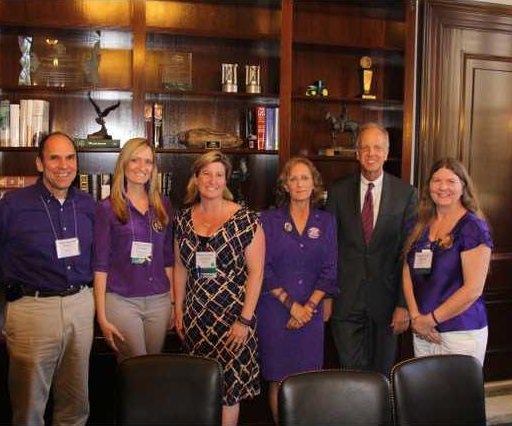After 39 radiation treatments over nine weeks, there are a number of things that still amaze Eldon Witthuhn: there were no symptoms and no pain, and treatments involved only minutes of his time.
The 62-year-old Hays resident was diagnosed with prostate cancer in September 2009, and on Aug. 19 of this year, he finished his SmartBeam radiation treatments at the Heartland Cancer Center. He is cancer free and will have checkups every three months.
Witthuhn and Dr. Claudia Perez-Tamayo, his radiation oncologist, are taking advantage of September being National Prostate Cancer Awareness month to share information.
"Men should get screened because all those things you hear about early detection are true," Witthuhn said. "The earlier you catch it, the more likely your treatment will be successful. My cancer was rather aggressive. Even though I was doing PSA tests every six months, by the time it was discovered, it was pretty advanced."
Witthuhn is a speech-language pathologist for Aegis Rehabilitation who sees clients in Larned and Wilson. He continued working through his treatments.
"The Heartland Cancer Center was the perfect place for me," Witthuhn said. "It took 10-15 minutes to come in, be treated and be back in my car. The technicians and everyone here are great.
"I was impressed with Dr. Claudia from our first visit," he continued. "She made me feel comfortable and explained fully the reasons for treatment and the probable outcome. I had confidence from the moment we met. If you have to do this, I would recommend doing it here."
He also noted that it may sound cliché but "the people coming here for treatments and those working here become a family. All the people I have met are supportive of one another."
Prior to his HCC treatment, Witthuhn’s family doctor discovered a nodule on his prostate, and Dr. Dan Witt of Hoisington was recommended. The nodule was benign but cancer was discovered after a follow-up PSA screening. A radical prostatectomy was performed in Topeka. Eighteen months later another PSA test led Witthuhn to HCC.
Dr. Perez-Tamayo noted that SmartBeam technology started as a treatment for prostate cancer and now treats some other cancers too. She was the first person anywhere to work with the precise technology while at the University of Michigan.
"It is so important for men to be screened with a PSA blood test," Dr. Perez-Tamayo said. "It is painless, convenient and highly effective. If left untreated, prostate cancer can eventually involve the bladder and rectum. That is an unhappy situation."
Even in light of these facts, she added, men often shy away from screenings. "I have been at events where they are giving free PSA tests and you can see the men go all the way around the booth," she said, gesturing with a wide sweep of her arm. "But we cannot stress enough the importance of being tested before a cancer invades your lifestyle."
Three basic screening categories are: men with symptoms such as urgency, frequency or other difficulty with urination at age 40 or older; men over 50, even with no symptoms; and men who have an abnormal rectal exam, even when their PSA is normal.
If a biopsy detects a cancer, the patient will learn his "Gleason Score (GS)" and the stage of the disease. A common GS is 7 and a common stage is called "T1c."
"With most cases, it is confined to the prostate only half the time," Dr. Perez-Tamayo said. "Leaving it alone could mean that attached organs could become involved. This may not result in death but there would certainly be quality-of-life problems.
"It is highly curable before it gets into vital organs; there is no reason to ignore it," she continued. "All those media stories that talk about not seeking treatment indicate that you could die of something else before prostate cancer is the cause. But those studies are in Scandinavian countries that have socialized medicine."
There are many treatment alternatives that involve varying degrees of surgery and varying degrees of radiation. SmartBeam radiation is one. Its precision allows the dosage to conform to the tumor’s shape, while reducing the amount of radiation to nearby healthy tissue.
Prevention suggestions include eating berries, especially blueberries, and plain yogurt, tomatoes and organic meat. Exercise and weight loss are also recommended because increased body fat is associated with increased risk.
Prostate cancer usually occurs in older men in their 60s and 70s, and family history is definitely a factor, Dr. Perez-Tamayo noted.
"Chances of cure in many cases are 95 percent," she stressed. "One-third of men over 75 get it. That’s a big number."





